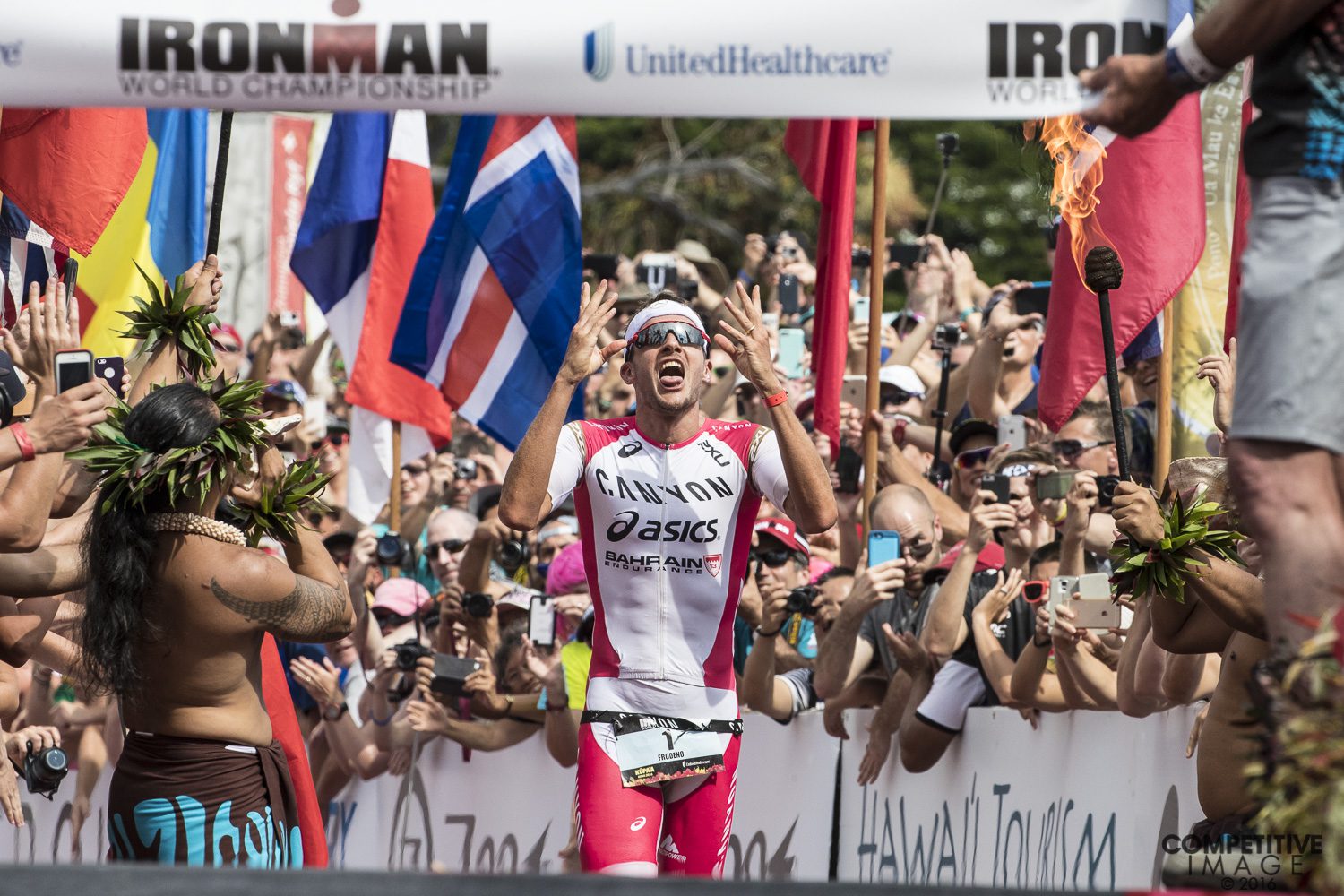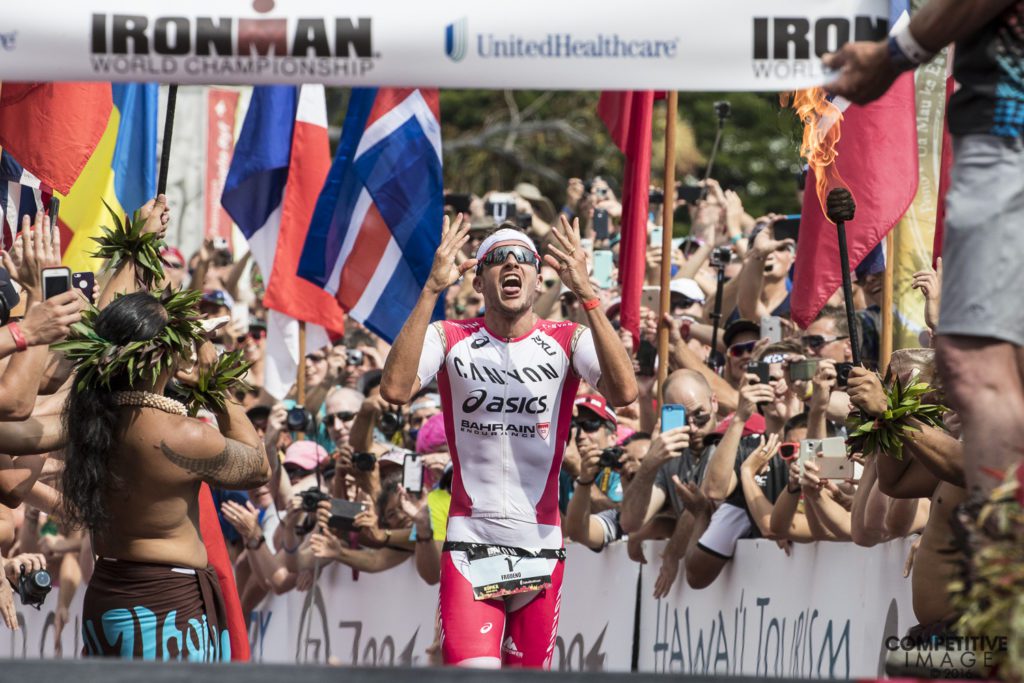Throwback Thursday: Frodeno’s Frightening Potential


Jan Frodeno yet again took the triathlon world by storm in 2016 when he claimed in second consecutive Kona win and broke the full distance world record. This story originally appeared in our September/October 2015 issue. Prior to his first world championship victory, TMC’s Kevin MacKinnon profiled Frodeno as the triathlon world wondered, could the German add the Kona crown to his gold medal resume?
Watching the guy run, you wonder how anyone can beat him. How fast is Jan Frodeno? This is the guy who won the four-man sprint at the Beijing Olympics, taking the gold over Canada’s very own Simon Whitfield. After moving to long distance racing towards the end of 2013, the man known as “Frodissimo” had spectators at Ironman 70.3 Oceanside gasping in awe as he simply ran away from some of the world’s best triathletes using those long, loping strides that a 6’4” frame allows. It was in a race that should have been a total disaster, though, that the triathlon world really got a glimpse of just how fast Jan Frodeno is.
At last year’s Ironman European Championship in Frankfurt, competing in his first Ironman race, Frodeno ran a 2:43 marathon. Impressive right? Not at all. Here’s what’s impressive about that run: he spent about six minutes on the side of the path along the River Main stretching out his legs as they cramped so badly he was forced to stop. When he was moving, he was running six-minute miles. When he wasn’t, he was at a dead stop. The cramps were just one of the many things that had gone wrong for the German that day. After leading the way out of the water, Frodeno managed to get three flats, which forced him to spend almost 15 minutes on the side of the road. As he pressed to try and get back into the race he didn’t get enough nutrition, which led to the cramps. What makes Frodeno the consummate professional, though, is the way he handled that tough day. Somehow he managed to put a positive spin on it, but most importantly, he learned from the experience.
“In terms of a learning curve, it couldn’t have gone better than it did in Frankfurt,” he said after the race. “To have a happy ending on the podium after a day of really sticking it out and giving it absolutely all I had – I was carried off from the finish line, there was nothing in me – and also dealing with the up and downs, all that taught me what Ironman is about. I was also happy to stick to my motto: If you have any way possible of getting to the finish line you need to. That’s what got me through.”
A few months later, on the Big Island, the 35-year-old arrived at the Ironman World Championship as one of the pre-race favourites, despite the fact that he’d never competed in Kona before. Since the long-distance Gods seem to be determined to continue his education, he flatted again, then managed to get a position penalty when he was trying to get himself back up with the leaders. Despite the four minute penalty, once again he held things together and finished third.
The learning appears to be done now. In July, returning to Frankfurt, Frodeno managed to beat defending Kona champ, Sebastian Kienle, at his own game, outriding his countryman on the way to a new Frankfurt bike course record (4:08), then running a 2:50 marathon in the 45 degree Celsius heat to set a new course record of 7:49:48. He finished almost 12 minutes ahead of Kienle and signalled to the world that he has this long distance thing figured out.
Not that any of this should be a surprise. Originally a swimmer, Frodeno was introduced to triathlon while growing up in South Africa. He did his first triathlon as a 19-year-old and it didn’t take long for his natural talent to help him progress in the sport. Born in Cologne, he returned to Germany to race in that country’s competitive “Bundesliga” club system and was named to the national team in 2002. His win at the Olympics six years later came as a bit of a surprise, but it shouldn’t have. The same drive that is now making him one of the most dominant long distance racers in the world was helping him achieve his Olympic dream back then, too.
“To win the Ironman world championship for me, personally, would be everything,” he said during an interview at last year’s European Ironman championship. “I was just talking to a media guy here and he interviewed me in 2005 and he remembered back then that “your eyes were glowing and you wanted to be world champion.” I have the same motivation and drive now. That goal … it just comes natural to me and I’m willing to work 365 days a year for it.”
“It was time for me to find a new challenge,” he continued. “I love the Olympics. To be honest the Olympics, for me, is still the greatest sporting event out there. But Ironman is like Wimbledon if you are a tennis player. You want to be there. You want to get your name up there.”
Of course the transition wasn’t easy. In his first Ironman 70.3 event in 2013 the volunteers couldn’t find his bike to run transition bag, which eventually cost him the win. At the Ironman 70.3 World Championship that year he was forced to pull out halfway through the run thanks to Achilles tendon issues. After dominating his next few 70.3 races in 2014, he had to endure the challenges of those first two Ironman races. (Even Frodeno’s wife, Olympic gold medalist and three-time world champion Emma Snowsill commented during the coverage of the race in Frankfurt that her husband had a lot to learn if he was ever going to be a contender in an Ironman.)
The podium finish in Kona certainly signalled that things were going in the right direction, but this year’s impressive Frankfurt race has taken Froden’s Kona status from contender to favourite. None of that is taken for granted by him, though. Unlike some who have move up to long-distance racing from the ITU stage, Frodeno is hardly ready to assume that because he spent over a decade of his life racing in the incredible competitive ITU and Olympic scene he’ll naturally dominate in Ironman and 70.3 racing.
“I think at the pointy end of the race it’s [long distance racing] always been competitive,” he says. “When ITU athletes like myself come up, some of the older crew are realizing they have to adapt their game plan, too. It just makes it more exciting. There are going to be shorter differences – there aren’t going to be guys winning by huge margins. It’s going to be tight right until the end.”
Last year’s Ironman 70.3 World Championship in Mont-Tremblant served as a preview to that prediction. Frodeno wasn’t the only ITU world champ in the field – four-time ITU world champion Javier Gomez arrived as a monstrous favourite, too. Bringing the same analytical approach to the race that he’d used for years in Olympic distance racing, Frodeno identified two main competitors: defending champion Kienle and Gomez, the man Frodeno considers to be “the greatest triathlete that we have currently.”
The race plan was simple: keep the pace up high during the swim and on the bike so Kienle, a weaker swimmer, would be in chase mode throughout the day. Then the idea was to hurt Gomez as much as possible on the bike. In the end 50 percent of the plan worked. Kienle was never a factor for the win, but Gomez was only a few seconds behind off the bike and managed to outrun Frodeno for the title. But it was close, proving Frodeno’s point that as we see more and more short course athletes of his calibre moving to long distance racing, we’re going to see some fireworks.
Which is exactly what we’re all anticipating in Kona later this year. Frodeno is hooked on distance training and racing, and knows exactly what is required to become an Ironman world champion.
“I’m surprisingly loving it,” he says of the move to long distance racing. “For a long time I thought that Ironman wouldn’t be for me. Now, honestly I am not missing the short course racing.”
Frodeno is also all too aware of just how hard it will be to win in Kona. In keeping with his attention to detail, he was out checking things out in Kona years before he would give the race a shot.
“I remember watching Crowie (Craig Alexander) in 2011 in Hawaii when he broke the course record. I started following him and watching him as he went along. He started walking 3 km out and I thought “this guys about to be world champion, in course record time, and he’s walking.” Coming from Olympic distance, my world just shattered. I didn’t know what just happened. So I realized the last hour, even if I’m having a great day, is going to suck.”
It might suck, but taking the world title would make all the pain that much more worthwhile. He’s done his homework. He’s paid his dues. He’s proven he can beat the very best in the sport. Now all he has to do is execute on the Big Island this October.
